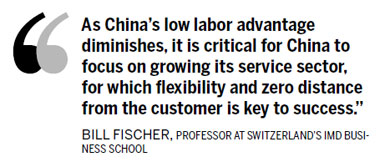

|
 Bill Fischer says what distinguishes Haier is an ability to learn new lessons. [Photo / China Daily]
|

Expert sees the innovative home appliance company leading the way
Courageous managers who turn employees into entrepreneurs will help China create a knowledge economy, says Bill Fischer, professor of innovation management at Switzerland's IMD business school.
Fischer, 67, who is also course director of an IMD-Cheung Kong Graduate School of Business joint program, says such a corporate structure is key to ensuring responsiveness to customers' needs in big companies.
"As China's low labor advantage diminishes, it is critical for China to focus on growing its service sector, for which flexibility and zero distance from the customer is key to success," he says.
A prime example of this is the Chinese home appliances manufacturer Haier, which Fischer studied with researchers Umberto Lago and Fang Liu for a book published earlier this year.
Reinventing Giants: How Chinese global competitor Haier has changed the way big companies transform traces Haier's rise from a low-quality manufacturer to an innovative and service-oriented brand over the past 30 years.
A key innovation of Haier's management structure is inverting the traditional relationship triangle - where managers are at the top, followed by middle management, then a sales team and finally customers - to one that positions customers at the top.
In the new structure, the customers' needs are learnt by the sales team and fed back to Haier's top managers, who make decisions about the company's strategies based on this information. The role of middle management is taken out of the model.
"Once customers are at the top, why do you need middle management? Is it to manage the top managers?" Fischer asks. "No. Many companies in the world say that they put customers first without knowing what it means. But Haier has executed it well."
At Haier, the company's management structure pivots around ZZJYTs (zi zhu jing ying ti, which in English means independent operation units).
Each new project or market opportunity leads to the formation of a ZZJYT, a dedicated small team of workers with a separate budget, functioning almost like an independent company.
Fischer and his co-authors studied Haier's three-door- refrigerator ZZJYT in detail. First a leader is selected who is then responsible for recruiting the team.
The ZZJYT model inspires entrepreneurial spirit in workers, Fischer says. It gives them decision-making power and motivation to work hard because their salary is directly related to the performance of the unit.
The key benefit of the ZZJYT arrangement is fast response to customer needs, he says, but such a structure requires courage by a company's top management to implement it.
To truly comprehend Haier's daring and innovation, one needs to understand the state of China's home appliances industry in 1984, when Haier was founded, Fischer says.
"Back in the early 1980s, there were no refrigerators in China. To store vegetables, you would dig a hole in the ground and bury them. When you needed your greens, you dug up the cabbages, washed them and cooked them."
"In 1984, refrigerators started to become available, but they were very hard to get because the supply was still very scarce. You would get people standing on the roads outside department stores with renminbi in their hands bidding to buy refrigerators."
 Models at Ford pavilion at Chengdu Motor Show
Models at Ford pavilion at Chengdu Motor Show
 Brilliant future expected for Chinese cinema: interview
Brilliant future expected for Chinese cinema: interview
 Chang'an launches Eado XT at Chengdu Motor Show
Chang'an launches Eado XT at Chengdu Motor Show
 Hainan Airlines makes maiden flight to Chicago
Hainan Airlines makes maiden flight to Chicago
 Highlights of 2013 Chengdu Motor Show
Highlights of 2013 Chengdu Motor Show
 New Mercedes E-Class China debut at Chengdu Motor Show
New Mercedes E-Class China debut at Chengdu Motor Show
 'Jurassic Park 3D' remains atop Chinese box office
'Jurassic Park 3D' remains atop Chinese box office
 Beauty reveals secrets of fashion consultant
Beauty reveals secrets of fashion consultant